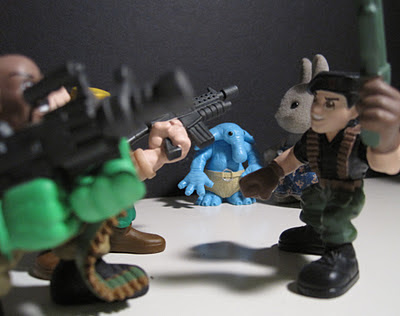A Case of Conscience
A Case of Conscience
James Blish, 1958
Premise: In 2050, four men are on a commission to the planet Lithia. They are there to evaluate the planet and its sentient natives, and render a recommendation about future contact with Earth. One man wants to turn the unique geology of Lithia into a nuclear arms factory, another is convinced the peaceful Lithian society could teach humanity a thing or two, one is unsure where he stands, and the fourth becomes convinced that since the Lithians have an orderly society without religion, that they must be demonic in origin. Yeah. If you have been hanging around here for a while, you already know I'm not going to like this guy. In the second half, the plot gets even weirder.
Some books I read on the wrong day. Some books I read in the wrong year. Some books I read too fast because they have to go back to the library. Some books fall victim to all three, so you can feel free to take this review with a grain of salt.
I was never going to wholeheartedly enjoy A Case of Conscience, if only because Catholic theology makes my eyes glaze over. As far as I can tell, this is the story of a perfectly nice planet, completely screwed over by idiotic humans, who bring their baggage with them everywhere. Since we follow said humans through many pages of their own internal maunderings, I found the book ultimately pretty boring. The science discussed has not aged well, and it doesn't help that it seems to be recapitulating (pun intended) parts of Burrough's The People that Time Forgot.
The larger problem is that I don't really care what happens to any of the human characters. Admittedly, Blish seems to make them intentionally unlikable. Also, there are completely obvious science-fictional explanations for the behavior of the Lithians, and the characters are too stupid to see them.
The first half of the book was originally published as a novella, and is not bad, if dated and melodramatic. But in the second half, it completely switches gears, and turns into a sort of weird cousin to Stranger in a Strange Land. The humans are given a Lithian egg to take back with them to Earth. They completely screw up the raising of such (which is not pointed out enough), and he grows up to be an amoral anarchist. Which is kind of what Earth seemed to need in this awkwardly dystopian future, so I'm not sure what the characters are complaining about. There's a rather baroque sex party, I guess to prove the dystopian-ness, or something? Father Ramon whines a lot about his moral failings, and then there's riots.
And then there's the end, which I do appreciate for its ambiguity. Unstated moral: humans wreck everything, and should be confined to their own planet for the safety of others. I don't think that I'm entirely off base with my interpretation, and I don't object to the moral given the circumstances, but ultimately I found this book disjointed and depressing.
2 Stars - An Okay Book
List of Hugo Award Winners




Comments
Post a Comment
FYI: Most comments are moderated, and will not appear immediately.